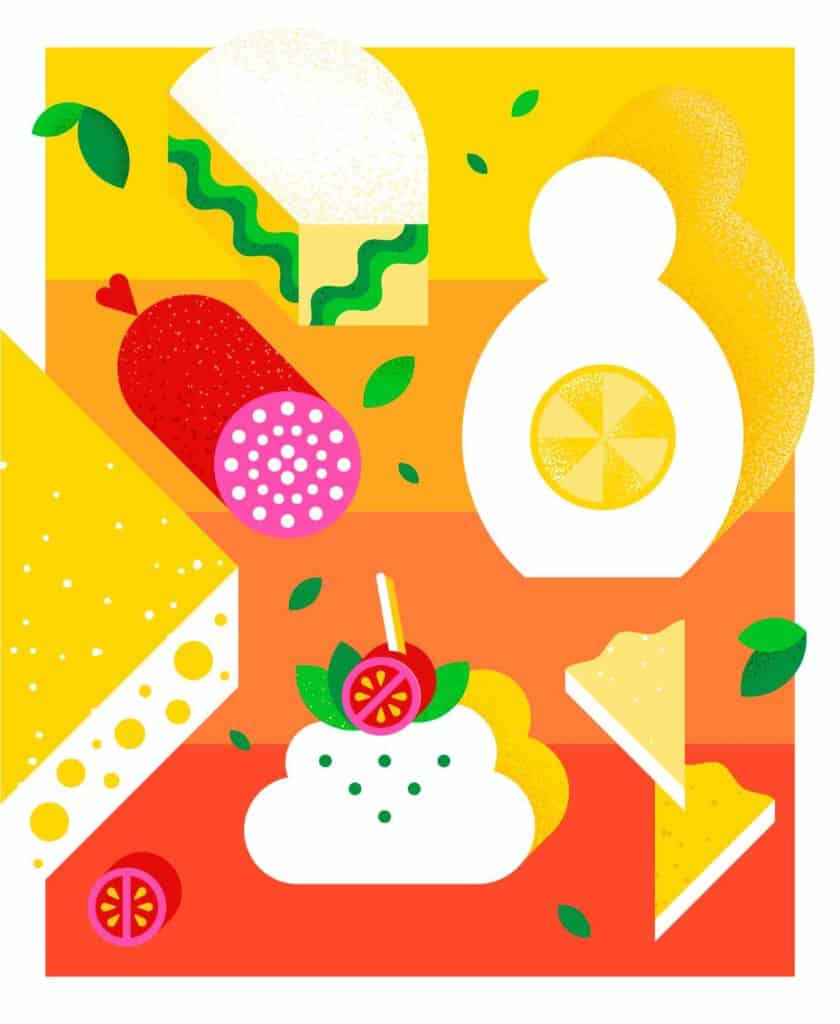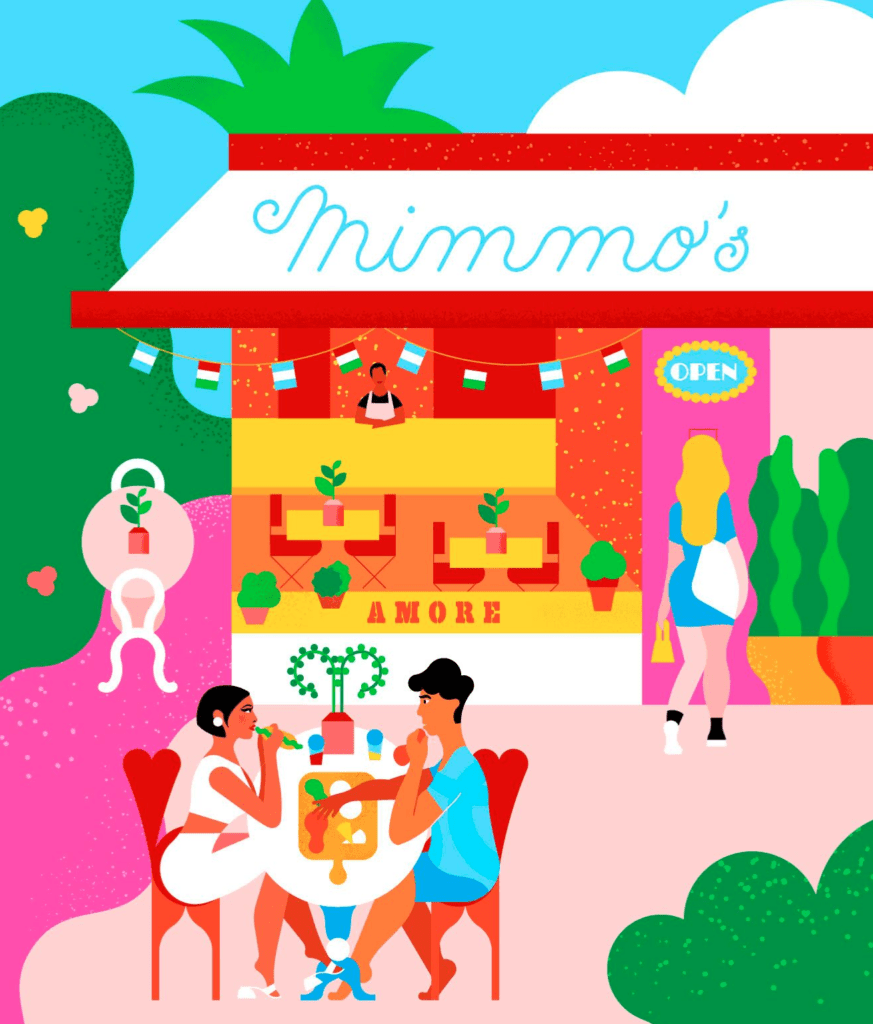
Illustrated by Pilar Torcal
If you’ve ever made fresh mozzarella at home, you know that it’s fairly easy as cheesemaking goes. You heat the curds, massage out the whey, and boom: You’ve got cheese.
Of course, that’s an extremely over-simplified version of the process. Mozzarella production might not seem that difficult on paper, but creating a balanced, creamy, delicate cheese over and over again, with just the right consistency and texture—well, that takes commitment and practice.
Bruno Ponce, founder and owner of popular Miami, Florida institution Mimmo’s Mozzarella Italian Market, knows all about that staunchness of character. Ponce was born in Argentina, where his father owned a restaurant that served breakfast and lunch. Ponce’s grandfather, however, was a native of Bari, Italy who settled in Buenos Aires to start a family. So while Ponce was not familiar with mozzarella in his younger days, perhaps cheesemaking lurked somewhere in his continental lineage.
After moving to Miami in 2000 and cutting his culinary teeth in the kitchen of Café Prima Pasta, Ponce landed a job at Soprano’s Pizzeria on South Beach. It was there he got his first real feel for house-made mozzarella—literally. By 2010 he was cooking at South Beach fine dining establishment Sardinia Enoteca Ristorante, pulling mozzarella under the guidance of a chef affectionately known as Mimmo (which means “baby” in Tuscan slang). This chef and cheesemaker would serve as Ponce’s mozzarella mentor.
Noting both the in-house demand for this cheese and its high turnover rate, Ponce started to wonder if he could perfect his own mozzarella and sell it to local restaurants like Sardinia Enoteca. Curious about its potential as a small business venture, he began teaching himself to make cow’s milk mozzarella in his apartment. When instinct failed, he used YouTube tutorials as a guide. Ponce practiced for months, testing cheeses on friends who were more than happy to sample the goods, before bringing his results back to the restaurant.
His perseverance paid off. Not only was Chef Mimmo impressed by the silky texture and milky flavor of Ponce’s mozzarella; he wanted to use it in the restaurant. “He asked to see the factory,”says Ponce, laughing. That’s when he knew he had to move operations from his home to an actual facility.
Miami isn’t known for its creameries, but the space Ponce found in 2011 in the then-industrial Little River neighborhood was coincidentally in one of the unglamorous warehouse bays of the city’s only dairy manufacturer, MacArthur Dairy. Next door was a Uruguayan-Argentinian specialty butcher, who had set up shop several years earlier. The businesses operated independently of one another, but once the local epicures found their way to one, they inevitably discovered the other. 
Still, foodies and friends comprised only about 20 percent of Ponce’s retail sales; the rest of his output went to local restaurants. Business was brisk, though, given that items like caprese and burrata were beginning to dominate Miami menus in the early 2010s. And those restaurants were top destinations, cashing in on the quality with justifiably high mark-ups. Ponce was the only full-time stretched-curd cheese artisan in town; the other (very few) fresh cheesemakers in Miami used goat’s milk to make chèvre-style cheese.
He was able to capitalize on the pasta filata trend without competition, and even began to supply curd to the few chefs who made mozzarella in their kitchens or tableside to order. The more diners tasted Ponce’s menu-credited mozzarella, however, the more they wanted to take some home. Looking for an opportunity to grow, Ponce leased an oddly shaped storefront on a wedge of a cross street in North Miami, and Mimmo’s Mozzarella Italian Market was born.
Retail cheese production began in 2014in the back room of the building with several walk-in refrigerators; Ponce opened a front-facing market stocked with Italian specialties one year later. He began serving lunch and early dinners at a few tables inside and a couple of open-air tables shaded by cheerful orange umbrellas. To this day, Mimmo’s exterior admittedly doesn’t give visitors much of a hint at its purpose, but inside the red-painted walls lined with imported Italian goods and a huge display case filled with wheels, rolls, and rounds of cheese say it all.
By 2016, Ponce had expanded his repertoire to 20 cheeses—all made from white or yellow curd shipped down from Rhode Island—by teaching himself to smoke and age. In addition to his success as a front-of-the-house restaurateur and deli operator, Ponce still supplies 30 restaurants as well as local markets with both cheese and curd. (He even has regular buyers as far out as Panama!) He holds mozzarella and burrata cheesemaking classes on the last Friday of every month, when up to 14 pupils warm, stretch, and mold curds into nodini and ovalini. He’ll give a tour of the premises to anyone who asks. This, he explains, is because “people [don’t] believe we make the cheese here.”
Call Miamians skeptics, but it’s true that a tropical climate is not a draw for cheesemakers. Even Ponce believes that people, himself included, don’t like cheese when it’s hot out. “Personally, I eat less cheese in the summer,” he admits.
Whatever the season, Mimmo’s, named after Ponce’s mentor, is lucrative. Ponce goes through 3,000 pounds of curd every two weeks—certainly a far cry from the experiments he conducted in his apartment all those years ago. Customers come from as far south as Coral Gables and as farnorth as Boca Raton to stock up for the month on his famous cow’s and buffalo’s milk mozzarella and burrata. As of early 2020, Ponce was so busy that he was considering a second location, weighing the pros and cons of popular hot spots like Wynwood versus quieter but up-and-coming neighborhoods like Little River.
Then the COVID-19 pandemic hit. At the time of writing, dine-in restaurants in Miami-Dade County are closed, which includes Mimmo’s 20-seat café. But Ponce is still able to sell cheeses, meats, and other market items for pick-up or delivery. Mimmo’s has long used GrubHub for menu items, but Ponce has undertaken personal delivery for orders of cheeses and meats over $50. He arrives at his customers’ doorsteps gloved and masked, and hands them a Styrofoam cooler containing their order on ice.
This isn’t the first time Ponce has faced a potential business-ending episode. In June 2016, an employee was shot and killed for unknown reasons in the back room of the market. The victim was a close friend of Ponce’s who had only been working at the store for a couple of months—it was right after the market converted to a café—and Ponce still mourns the loss.
Despite the tragedies, Mimmo’s Mozzarella Italian Market thrived. Now loyal fans are rooting for Ponce, hoping that with community support, he’ll make it through once again. Miamians may or may not be invested in cheese all day, every day, but that depends on who you ask. Still, this city’s got a lock on loyalty. And they’ll always favor Mimmo’s Mozzarella.




